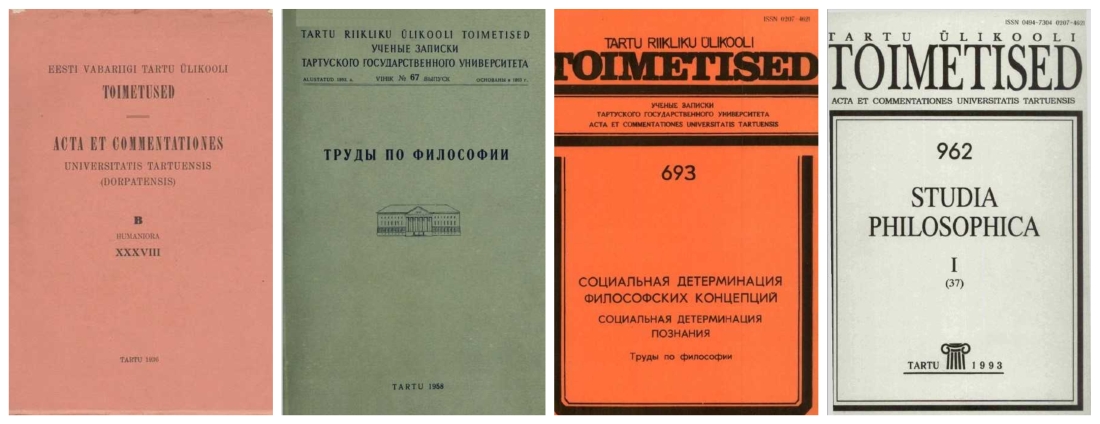About the Journal
Focus and Scope
Studia Philosophica Estonica is an academic peer-reviewed journal based at the University of Tartu Institute of Philosophy and Semiotics. The journal is open to contributions from any country and in all areas of philosophy. The journal publishes scholarly articles in English, German, and Estonian. Studia Philosophica Estonica is indexed by EBSCO, ERIH PLUS and DOAJ.
The purpose of Studia Philosophica Estonica is to publish scholarly papers and notes embodying original research in all areas of philosophy. We encourage interdisciplinary contributions and submissions that use new approaches to elucidate their topic, provided they conform to the contemporary standards of scientific rigor. We also publish book notices and reviews.
Be sure to check the guidelines for contributors before submitting your article, if your submission answers to a specific call for papers, check the relevant call for a specification of submission guidelines.
Publication Ethics and Publication Malpractice Statement
The journal adheres to the following publication ethics and malpractice statement issued by the University of Tartu Press.
- Publication and authorship
- All submitted papers are subject to strict peer-review process by at least two international reviewers that are experts in the area of the particular paper.
- The factors that are taken into account in review are relevance, soundness, significance, originality, readability and language.
- The possible decisions include acceptance, acceptance with revisions, or rejection.
- If authors are encouraged to revise and resubmit a submission, there is no guarantee that the revised submission will be accepted.
- Rejected articles will not be re-reviewed.
- No copyright infringement, plagiarism or presentation of fraudulent data is alllowed.
- No same research can be published in more than one journal
- All papers include a list of references and, if applicable, a list of financial supporters.
- Authors' responsibilities
- Authors must certify that their manuscripts are their original work.
- Authors must certify that the manuscript has not previously been published elsewhere.
- Authors must certify that the manuscript is not currently being considered for publication elsewhere.
- Authors are obliged to participate in the peer review process.
- Authors are obliged to provide retractions or corrections of mistakes.
- All authors mentioned in the paper must have significantly contributed to the research.
- Authors must state that all data in the paper are real and authentic.
- Authors must notify the Editors of any conflicts of interest.
- Authors must identify all sources used in the creation of their manuscript.
- Reviewers' responsibilities
- Reviewers should keep all information regarding papers confidential and treat them as privileged information.
- Reviews should be conducted objectively, with no personal criticism of the author.
- Reviewers should express their views clearly with supporting arguments.
- Reviewers should identify relevant published work that has not been cited by the author.
- Reviewers should also call to the Editor in Chief's attention any substantial similarity or overlap between the manuscript under consideration and any other published paper of which they have personal knowledge.
- Reviewers should not review manuscripts in which they have conflicts of interest resulting from competitive, collaborative, or other relationships or connections with any of the authors, companies, or institutions connected to the papers.
- Editors' responsibilities
- Editors have complete responsibility and authority to reject/accept an article.
- Editors should guarantee the quality of the papers and the integrity of the academic record.
- Editors should publish errata pages or make corrections when needed.
- Editors should have a clear picture of a research's funding sources.
- Editors should base their decisions solely one the papers' importance, originality, clarity and relevance to publication's scope.
- Editors should not reverse their decisions nor overturn the ones of previous editors without serious reason.
- Editors should preserve the anonymity of reviewers.
- Editors should preserve the anonymity of the authors.
- Editors should ensure that all research material they publish conforms to internationally accepted ethical guidelines.
- Editors should only accept a paper when reasonably certain.
- Editors should act if they suspect misconduct, whether a paper is published or unpublished, and make all reasonable attempts to persist in obtaining a resolution to the problem.
- Editors should not reject papers based on suspicions, they should have proof of misconduct.
- Editors should not allow any conflicts of interest between staff, authors, reviewers and board members.
Publication Frequency
Studia Philosophica Estonica is published annually.
Open Access, Licensing, and Copyright Policy
Studia Philosophica Estonica provides immediate open access to its content on the principle that making research freely available to the public supports a greater global exchange of knowledge. All papers are published under CC BY-NC-ND License.
Authors retain the copyright of their work. By submitting to our journal, authors grant us the right of first publication. Authors can distribute their published work in institutional repositories, personal websites, or other platforms, acknowledging its initial publication in our journal.
Studia Philosophica Estonica does not charge any fees from authors for processing and publishing submissions.
Archiving
This journal utilizes the LOCKSS system to create a distributed archiving system among participating libraries and permits those libraries to create permanent archives of the journal for purposes of preservation and restoration. More info
History of the Journal
The history of this journal can be traced back to the Acta et Commentationes Universitatis Tartuensis which were founded in 1893; after WWII it was continued during the Soviet period as Papers on Philosophy which, as a series of Tartu University Transactions was published almost entirely in Russian. Since 1993 the journal was published primarily in Estonian and called Studia Philosophica.
In 2008 the journal was re-launched under the name Studia Philosophica Estonica. It publishes peer-reviewed articles in English, German and Estonian and is open to international contributors.

Journal covers from 1936 to 1993.




